Uncategorized
Dr. Balbir Launches Important Mental Health Project in Villages
Introduction
On a sunny Tuesday in Mohali, the Health Minister of Punjab, Dr.
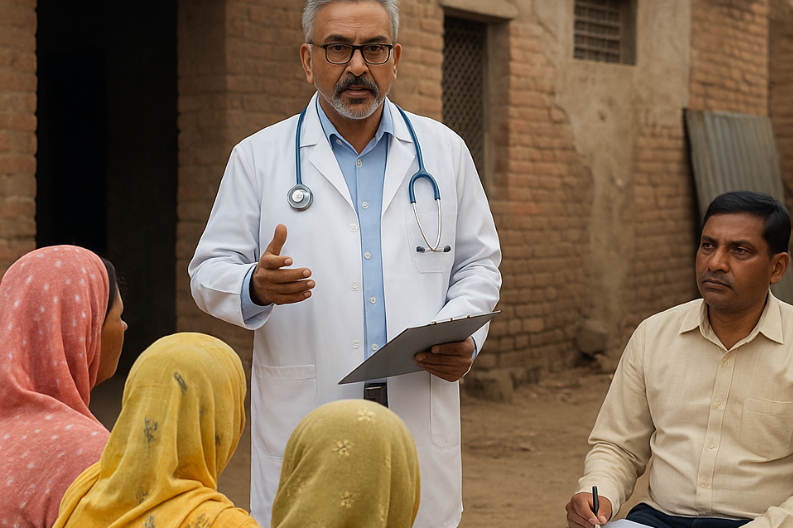
Dr. Balbir Launches Important Mental Health Project on a sunny Tuesday in Mohali, aiming to support rural communities struggling with mental health and substance use problems. The initiative, supported by the Indian Council of Medical Research (ICMR) and guided by experts from PGIMER, Chandigarh, will bring screening and treatment directly to villages.
Dr. Balbir highlighted a serious gap in care, noting that only 10 to 25 out of every 100 people with mental health issues in India receive treatment. He explained that stigma, lack of awareness, poor access, and high costs prevent many from seeking help. By introducing doorstep screening and treatment, the project hopes to bridge this gap while reducing stigma.
Mental health remains as vital as physical health, yet villagers often lack access to proper services. Many avoid speaking about their struggles due to social stigma, fearing judgment or misunderstanding. This silence often delays treatment, worsening conditions. The new project aims to change attitudes through awareness, education, and treatment opportunities at the community level.
Moreover, trained professionals, guided by PGIMER experts, will work within rural areas to identify those in need, offer early support, and connect them to affordable or free treatment. Workshops and talks will help villagers understand conditions like anxiety, depression, and substance use, dismantling long-held misconceptions about mental illness.
Accessibility and affordability are central goals of the project. While urban areas often have hospitals and clinics, villagers must travel long distances and bear high costs. By offering free screening and linking people to low-cost services, the program removes key barriers to care.
Initially, the project will cover select villages in Mohali, with the possibility of expanding across Punjab if successful. Local health workers will monitor progress by tracking the number of screenings and treatments, ensuring continuous improvement.
In conclusion, Dr. Balbir Launches important Mental Health Project to make mental health care more accessible, affordable, and stigma-free in Punjab’s villages. This pilot effort marks a crucial step toward creating a supportive community where mental well-being is recognized and prioritized. 🌱
Uncategorized
A New Hope for Spine Patients: Dr. Aditya’s Groundbreaking Surgery in Tricity
Jammu, November 16: A big step for spine care has taken place in Tricity.
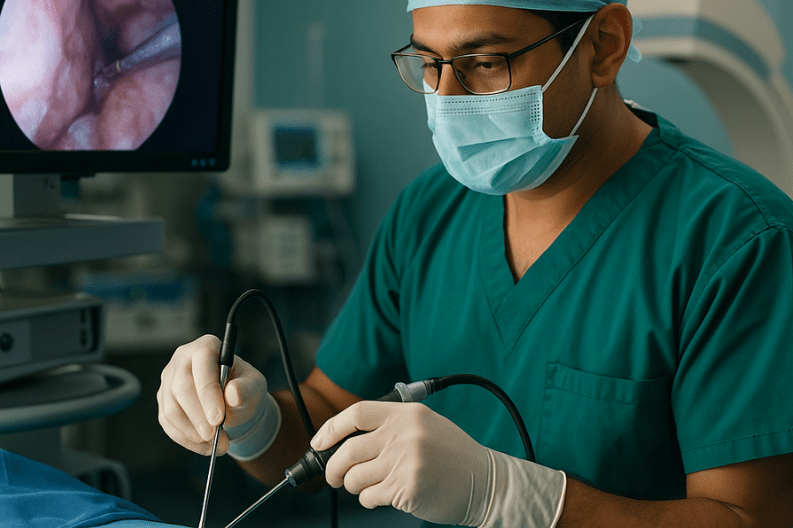
Dr. Aditya’s Groundbreaking Surgery in Tricity marks a major step in modern spine care. Dr. Aditya Gupta from Paras Hospital, Panchkula, performed the region’s first awake endoscopic spine surgery. The patient stayed awake under local anaesthesia, which made the procedure safer for someone with heart issues. The technique used a very small 6-8 mm cut, making it far less invasive than traditional spine surgery. Because the patient breathed on his own, the surgery avoided the risks linked to general anaesthesia. Dr. Aditya used a transforaminal endoscopic approach, which helped him target pain-causing spots with accuracy and avoid nerve damage.
Moreover, Dr. Aditya said this keyhole method speeds up recovery. Blood loss stays extremely low. Many patients can walk within an hour of the surgery. This gives confidence to people who fear long recovery periods. This success also shows how fast medical care is improving in the Tricity region, including Chandigarh and Mohali.
Furthermore, Dr. Aditya’s strong education adds to his skill. He completed his MBBS and MS in Orthopaedics in Jammu. Later, he trained at PGI Chandigarh and ranked first in the All India Fellowship Examination in Spine Surgery. He also trained further at leading centers in Ahmedabad and New Delhi. His father, Dr. Rajesh Gupta, heads Orthopaedics at ASCOMS & Hospital in Jammu, which greatly influenced his career path.
Additionally, the Tricity region is becoming known for advanced healthcare. New methods like awake endoscopic spine surgery show how hospitals focus on safe and effective treatments. This helps patients who cannot go through major surgeries due to conditions like diabetes, heart disease, or breathing problems.
As medical technology grows, doctors aim to reduce pain and avoid complications. Awake endoscopic spine surgery supports this goal. It lowers surgical stress, reduces hospital costs, and helps patients return to normal life faster.
In addition, the success of this operation motivates more doctors in the region to learn similar techniques. This will support many more patients who need spine care but fear high-risk procedures. It also boosts the Tricity area’s role as a developing medical hub.
In conclusion, Dr. Aditya’s Groundbreaking Surgery in Tricity stands as a major milestone in spine care. His work brings safer, quicker, and more advanced options to patients and strengthens the future of healthcare in the region.
Uncategorized
Severe Negligence Alleged at Maharana Bhupal Hospital as Family’s Pleas Go Ignored
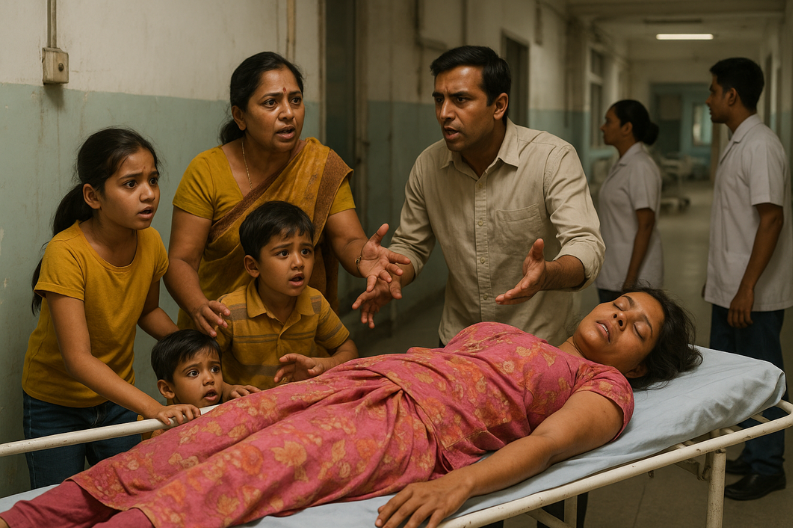
Udaipur: A serious incident where severe negligence alleged at Maharana Bhupal Hospital. A family alleges that hospital staff ignored their repeated calls for help while a mother in critical condition struggled without support. Her two young children and relatives searched desperately for anyone who could assist, but no staff member stepped forward.
Eyewitnesses say the family asked for immediate medical attention several times. Each request went unanswered. As minutes passed, panic grew. What began as a medical emergency soon turned into a moment of deep shock for everyone present.
The family’s account questions the hospital’s emergency response system and the responsibility of on-duty staff. They believe the delay could have changed the course of their lives. “One moment of negligence can change an entire family’s future,” a relative said. They argue that a life-saving institution cannot afford such lapses, especially during critical moments.
Hospital officials have not released a statement so far. The incident has sparked public concern, and many citizens are demanding a quick inquiry and stricter enforcement of patient-care standards.
At its core, the allegation is alarming. A hospital built to protect lives may have ignored a family’s desperate pleas. If the account proves accurate, the problem goes beyond poor care. It reflects a troubling system failure.
For the family, even a short delay carried heavy consequences. For the hospital, this moment calls for transparency and reform. In the days ahead, key questions will shape the investigation: Did staff truly fail to respond? Did they misjudge the urgency? And is this an isolated failure or part of a deeper pattern?
Uncategorized
PM Modi Meets the Victim of the Delhi Blast: A Detailed and Clear Report
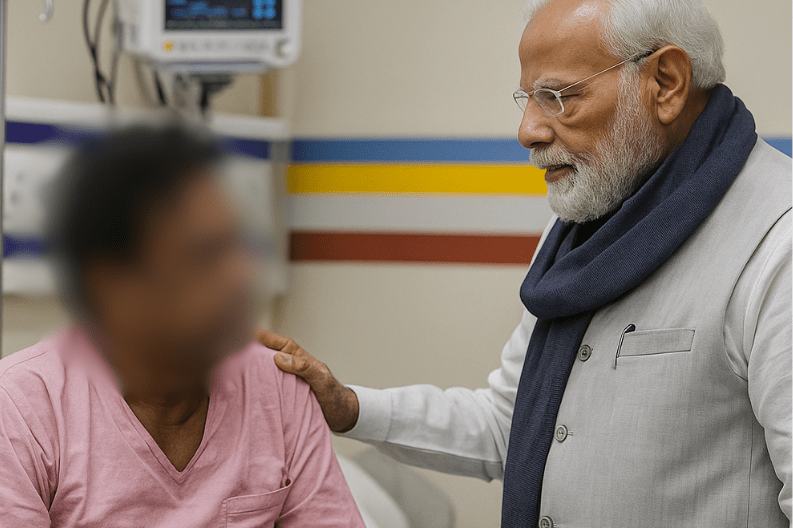
Prime Minister Narendra Modi returned from Bhutan, and PM Modi meets the victim of the Delhi blast, soon after he landed in Delhi. He went straight to Lok Nayak Jai Prakash (LNJP) Hospital on Wednesday. There, he met every injured person and asked about their health. He also spoke with doctors about the treatment. PM Modi told the hospital staff that the government would act fast to support the victims. Security outside the hospital remained very tight due to the serious situation. The blast near the Red Fort on Monday evening killed nine people and injured more than twenty. It happened during rush hour, and many people were scared.
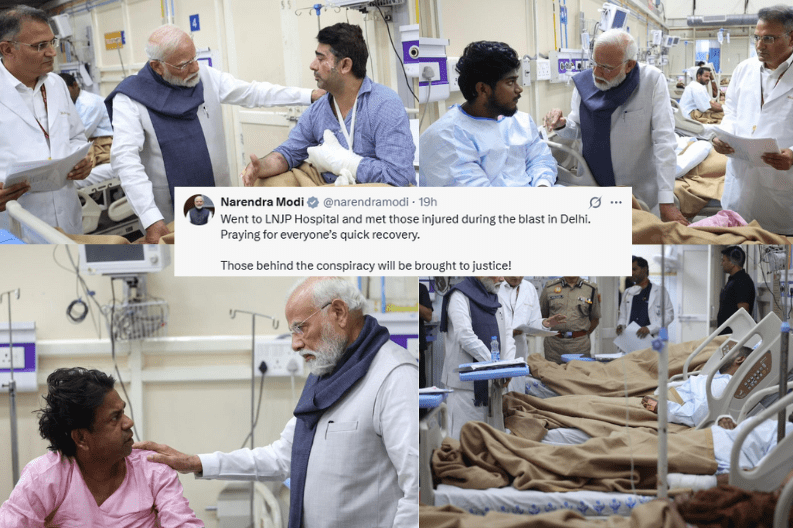
Investigators said the explosion came from a slow-moving Hyundai i20 filled with explosives. The blast damaged several vehicles nearby. Soon after the incident, security agencies arrested eight suspects. This group included three doctors. Police also found nearly 2,900 kg of explosive material linked to Jaish-e-Mohammed and Ansar Ghazwat-ul-Hind. Officers found more ammonium nitrate at a private university in Faridabad. Officials believe the suspects planned to attack during Diwali and later on Republic Day, but they failed to carry out their plans.
Home Minister Amit Shah held an urgent security meeting after the blast. He asked all security teams to work closely and check every detail. The National Investigation Agency (NIA) now leads the case. Security alerts have increased across Delhi, Uttar Pradesh, Bihar, and Mumbai. Police are checking more people at metro stations, markets, bus stops, and religious places. Investigators are also trying to confirm if the blast was a suicide attack because the driver, believed to be Dr. Umar Nabi, died at the scene.
During his Bhutan visit, PM Modi spoke about the tragedy. He said he felt deep sorrow for the victims. He promised that the people behind the blast would face the strictest punishment. After he returned, he posted on X and prayed for the fast recovery of all the injured. Experts are studying the explosive materials now. Early reports show that the bomb was extremely powerful, even stronger than ammonium nitrate bombs used before.
As the investigation continues, the government is trying to assure citizens that the city is safe. More police teams now guard crowded places to prevent further danger. PM Modi said such attacks will not break India’s unity. He ended the day by promising that everyone involved in the planning or execution of the blast will face justice. With his strong message and his hospital visit, PM Modi meets the victim of the Delhi blast, which stands as a clear sign that the government will support the victims and protect the country.
-

 City Guide3 years ago
City Guide3 years ago3B2 Mohali Market Shops: Discover 44 Hidden Gems
-

 Entertainment3 years ago
Entertainment3 years agoTop 15 Punjabi Models – Male and Female List
-

 Entertainment3 years ago
Entertainment3 years agoTop 11 Punjabi Comedians of All Time
-

 Jobs4 years ago
Jobs4 years agoTop 20 IT Companies in Mohali
-

 Food4 years ago
Food4 years ago11 Best Restaurants in Mohali You Must Visit
-

 Food3 years ago
Food3 years agoTop 15 Cafes in Mohali you must visit
-

 Property2 years ago
Property2 years agoWho Lives In Homeland Mohali: Punjabi Celebrities, Business People…
-

 Education2 years ago
Education2 years ago10 Famous Punjabi Writers With A Great Impact On The Literary World
